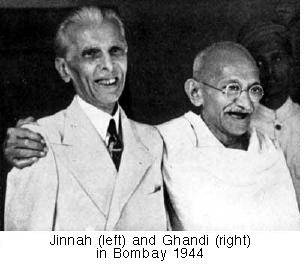Mohammed Ali Jinnah
Indian muslim politician and first governor-general of Pakistan, b. 25 December 1876 (Karachi, India [now Pakistan]), d. 11 September 1948 (Karachi).
 Mohammed Ali Jinnah was the son of a prosperous merchant. He attended a madrasah high school and passed the matriculation examination for the University of Bombay at the age of 16. His parents then sent him to London to gain business experience; following Indian custom they arranged a marriage for him before his departure.
Mohammed Ali Jinnah was the son of a prosperous merchant. He attended a madrasah high school and passed the matriculation examination for the University of Bombay at the age of 16. His parents then sent him to London to gain business experience; following Indian custom they arranged a marriage for him before his departure.
The young Jinnah preferred law over business, and at the age of 19 he was admitted to the bar. He also frequently visited the House of Commons (parliament) to study the British political system.
When he returned to Karachi in 1896 his father's business was in bad shape, and Jinnah decided to establish himself as a lawyer in Bombay. He did not enter politics until 1906, when he attended the Calcutta session of the Indian National Congress and heard its call for dominion status (and later for independence). In 1910 he was elected to the Imperial Legislative Council.
Jinnah's major aim was to look after muslim interests in a united India. For several years he stayed away from the All-India Muslim League which, founded in 1906, called for a separate muslim state. He joined the League in 1913, having received assurances that the League was as much interested in Indian emancipation as the Congress party. He was elected president of the Bombay branch of the Indian Home Rule League at its formation.
In the following years Jinnah became known as "the best ambassador of Hindu-Muslim unity." On his intiative Congress and the Muslim League held their annual meetings together and in 1916 signed the Lucknow pact, the blueprint for their joint demands for constitutional reform. The pact contained provision for separate Hindu and Muslim electorates.
Jinnah was committed to change through constitutional reform. He disliked the dominant Hindu character of Ghandi's campaign of civil disobedience and left both the League and Congress in 1920. His advocacy of Hindu-Muslim unity was obstructed by the rise of Hindu fundamentalism, a result of the defeat of the disobedience campaign.
Against a backdrop of communal violence and the rise of religious groups such as the Muslim Khilafat committee, Jinnah tirelessly tried to convince the educated classes of the need of Hindu-Muslim unity. He participated in the legislative assembly and in the round table conferences in London 1930 - 1932 and developed his 14 point plan, which included a federal system of government, guarantees for minorities, and one-third representation for Muslims in the central legislature.
He found that Congress was not willing to entertain even the most modest Muslim proposals. Muslim organizations, on the other hand, complained that he was too accommodating to Hindus. Disillusioned, Jinnah left for London to practice law again.
In 1935 Jinnah was persuaded to return and head a revitalized League in preparation for elections under the Government of India Act. He supported again collaboration between Congress and the League. But when Congress faired well in the elections of 1937 and decided against inclusion of Muslims in all its provincial governments, Muslim discontent grew rapidly, and a turning point had been reached.
Jinnah noticed the fast growth of a political Hindu establishment. Fearful not so much of religious persecution but of complete exclusion of Muslims from political and economic power and from social advancement, he came to adopt the idea - first muted in 1930 but rejected by him at the time - of a separate Muslim state. Urged on by him, the League adopted in 1940 a resolution to form the state of Pakistan. Against the opposition of Congress, Ghandi, Neru and Britain he received growing support from the Muslim constituencies. By 1947 Pakistan was born, with Jinnah its first head of state at the age of 70.
Jinnah worked hard to help the new nation, clearly the poorer half of the partition, on its feet. Pakistanis revered him as the father of the nation and Qa'id-e A'zam ("Great Leader"). He dedicated his energy to his country until days before his death a year later. None of his successors measures up to him for his support of religious tolerance and social cohesion on the subcontinent.
Photo: public domain (Wikipedia)
home
 Mohammed Ali Jinnah was the son of a prosperous merchant. He attended a madrasah high school and passed the matriculation examination for the University of Bombay at the age of 16. His parents then sent him to London to gain business experience; following Indian custom they arranged a marriage for him before his departure.
Mohammed Ali Jinnah was the son of a prosperous merchant. He attended a madrasah high school and passed the matriculation examination for the University of Bombay at the age of 16. His parents then sent him to London to gain business experience; following Indian custom they arranged a marriage for him before his departure.